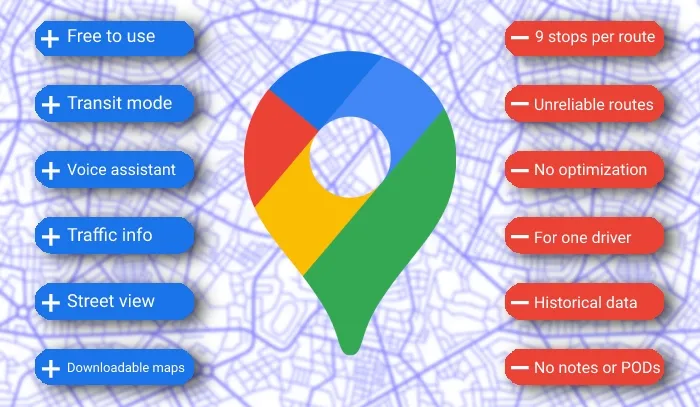The Pros and Cons of Google Maps: Navigating the Benefits and Drawbacks...!!!
Google Maps is a powerful and versatile tool offering numerous benefits such as accurate navigation, real-time traffic updates, and detailed local business information. However, it also comes with drawbacks like privacy concerns, battery drain, and data usage.

Pros and Cons of Google Maps
Introduction
Google Maps, a widely-used web-based mapping service developed by Google, has become an indispensable tool since its launch in 2005. Offering a plethora of features such as route planning, real-time traffic updates, and street views, it caters to millions of users worldwide. However, alongside its numerous benefits, Google Maps also comes with certain drawbacks.
Pros of Google Maps
-
Accurate Navigation
-
Google Maps delivers accurate and reliable navigation, aiding users in finding the best routes to their destinations. The service provides turn-by-turn directions for driving, walking, cycling, and public transportation, making it easy to navigate unfamiliar areas.
-
-
Real-Time Traffic Updates
-
A standout feature of Google Maps is its provision of real-time traffic updates. The app alerts users to traffic jams, road closures, and accidents, enabling them to choose alternative routes and avoid delays. This feature is especially beneficial for daily commuters and long-distance travelers.
-
-
Street View
-
The Street View feature offers panoramic views of streets and neighborhoods, allowing users to virtually explore areas before visiting. This is useful for planning trips, checking out new locations, and viewing properties for rent or sale.
-
-
Local Business Information
-
Google Maps contains detailed information about local businesses, including restaurants, hotels, gas stations, and more. Users can access reviews, photos, contact details, and opening hours, facilitating informed decisions about where to go and what to do.
-
-
Offline Maps
-
Users can download maps for offline use, particularly useful when traveling to areas with limited or no internet connectivity. This ensures access to navigation and location information even without a data connection.
-
-
Integration with Other Google Services
-
Google Maps integrates seamlessly with other Google services like Google Calendar, Gmail, and Google Assistant. This integration allows users to access location-based reminders, appointments, and more, enhancing the overall user experience.
-
-
User-Friendly Interface
-
Featuring a user-friendly interface, Google Maps is easy to navigate and understand. Its intuitive design ensures that users can quickly find the information they need without any hassle.
-

Cons of Google Maps
-
Privacy Concerns
-
A primary drawback of Google Maps is the potential privacy concerns. Google collects substantial user data, including location history, raising concerns about data security and privacy.
-
-
Battery Drain
-
The constant use of GPS and real-time updates can quickly drain a smartphone's battery. Users may need to carry portable chargers or limit their use of the app to conserve battery life.
-
-
Data Usage
-
Google Maps relies on internet connectivity for real-time updates and navigation, leading to high data usage. This is particularly significant for users who frequently use the app for long-distance travel. Offline maps can mitigate this issue but require prior download and storage space.
-
-
Accuracy Issues in Remote Areas
-
While highly accurate in urban and well-mapped areas, Google Maps may not be as reliable in remote or rural locations. Users may encounter inaccuracies in road layouts, missing landmarks, or outdated information in less populated regions.
-
-
Dependence on Internet Connectivity
-
Full functionality relies on internet connectivity, which can cause delays or difficulties in obtaining real-time updates and directions in areas with poor or no internet access.
-
-
Ads and Sponsored Content
-
Ads and sponsored content in Google Maps can be distracting and affect the overall user experience. These ads are often based on user location and search history, raising additional privacy concerns.
-
-
Complexity for New Users
-
Despite its general user-friendliness, new users may find some features and settings complex or overwhelming. The wide range of functionalities can be intimidating for those unfamiliar with its interface.
-
Google Maps is a powerful and versatile tool offering numerous benefits such as accurate navigation, real-time traffic updates, and detailed local business information. However, it also comes with drawbacks like privacy concerns, battery drain, and data usage. Understanding the pros and cons of Google Maps allows users to make informed decisions about utilizing the service to meet their needs effectively.
What's Your Reaction?

















